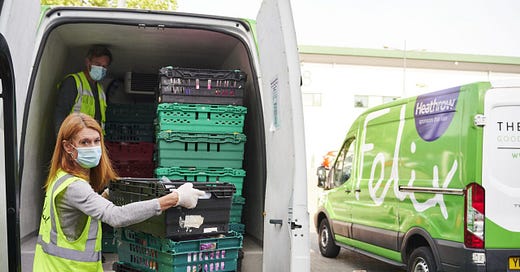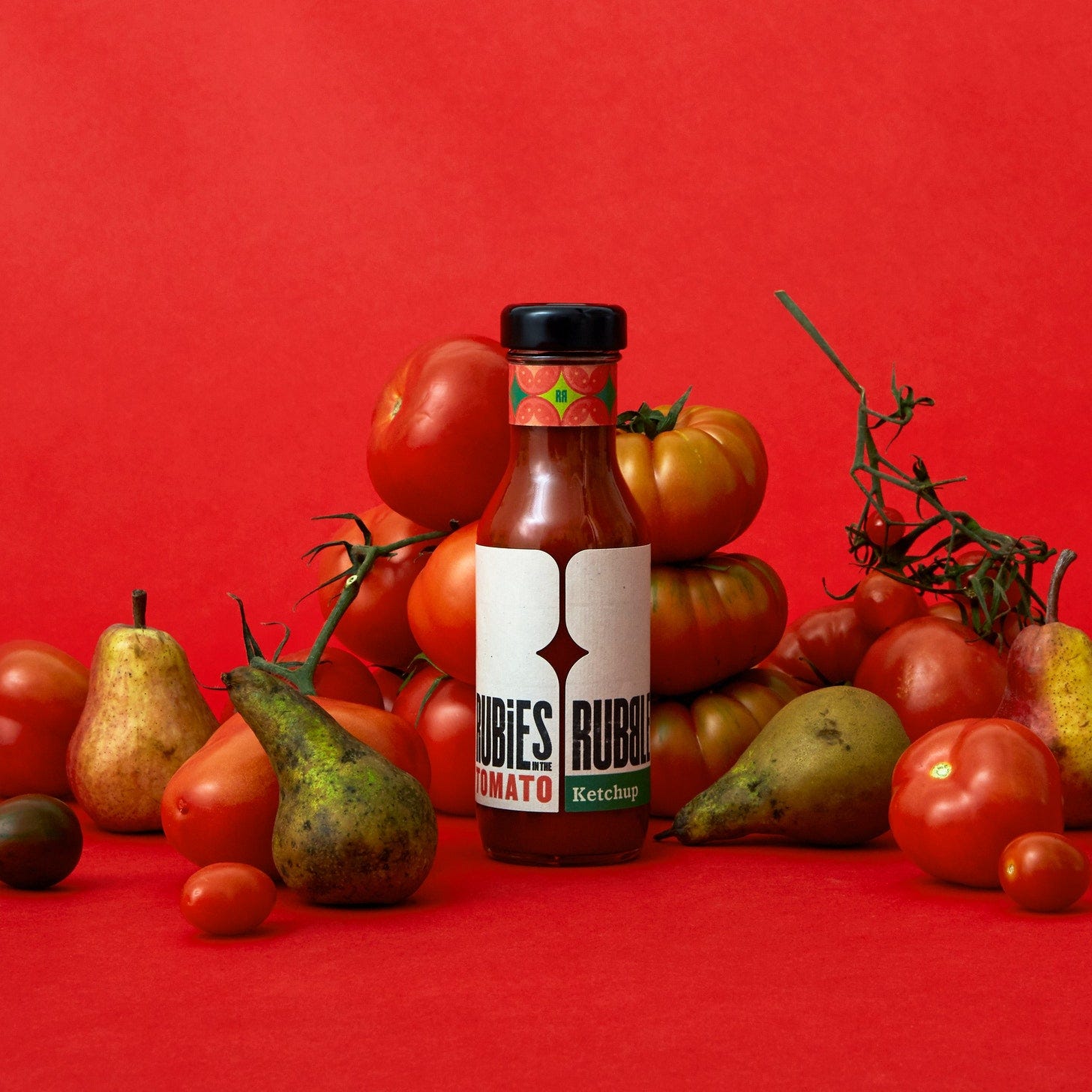🌱 Need a business case for reducing food waste? Read on...
Featuring Kadalys, Guardians of Grub, Rubies in the Rubble and more...
Happy Friday!
Ahead of International Day of Awareness of Food Loss and Waste, this week we are focusing on food waste and upcycling. We cover:
Target, Measure, Act: How your business can eliminate food waste, with two key resources to get you started.
How Kadalys are upcycling surplus bananas into cosmetics, and working closely with farmers in the process.
In case you missed it: Rubies in the Rubble are packing a punch in the fight against food waste, featuring Jenny Costa, Founder and CEO.
> Good News This Week
🎯 Crocs is introducing a new bio-based Croslite material into its product lines to lower its carbon footprint. This is part of the company’s pledge to become a net-zero brand by 2030, as it targets a 50% reduction in its carbon footprint per pair of Crocs shoes.
⭐️ Tesco announced it was strengthening its climate targets, by aiming for net zero emissions across their entire value chain by 2050. They also revealed new targets to achieve net zero emissions across their global operations by 2035.
⭐️ PepsiCo announced its company-wide ambitions to reach net-zero by 2040, and also be water positive by 2030. Plans include the scaling of SodaStream to help cut virgin plastic per serving by 50% across its global food & beverage portfolio.
⭐️ Morrisons is set to save 45 million single-use plastic bags each year from its stores, by removing the plastic packaging on their bananas. The packaging will be replaced by paper bags.
⚡️ Climatiq announced their $2 million raise, led by Cherry Ventures, to help them build the 'wikipedia of carbon footprinting'.
⚡️ B Lab and Fairtrade announced a new partnership aimed at advancing the United Nations Sustainable Development Goals (SDGs) through responsible business practices, sustainable supply chains, and global corporate transparency.
> Click on each link to read more.
> Quick Take
Target, Measure, Act: How your business can eliminate food waste.
Wednesday next week is International Day of Awareness of Food Loss and Waste. Thanks to campaigns such as Love Food Hate Waste, the public are increasingly conscious of the food they’re throwing away. Since 2017, household food waste has reduced by half a million tonnes. Yet, it can be argued that businesses are falling behind their customers in their efforts. Researchers estimate that across the entire global supply chain, more than 80% of the total food produced is lost.This is a shocking systemic problem that needs to be addressed, and businesses of all sizes can make a real impact.
For those ready to address it, there are substantial rewards to be reaped. The World Resources Institute provides this knockout statistic: “In 700 companies, in 17 countries, 99% of sites had a positive return on their investment in food loss and waste reduction, and half of these sites had a return greater than 14-fold”.
(Want some hard numbers? Guardians of Grub has a cost-saving calculator to help you understand how much money you could save through waste-saving strategies).
There’s no doubt that It’s a complex problem: “Food waste is an end-to-end challenge that requires end-to-end solutions”. Thanks to organisations such as WRAP, from whom this quotation is taken, such solutions have never been more readily available. There are a myriad of resources, how-to guides and schemes specifically designed to help businesses fight food waste from the ground up. We’re highlighting two of the best...
The WCPs, a partnership between WRAP and IGD, are a comprehensive toolkit for businesses, whether you’re taking the first steps or are familiar with basic concepts.This collection of free resources provides industry-specific guides, helpful templates such as supply-chain engagement letters and hotspot identification tools. Every step is designed to deliver results, rather than shifting the problem along the chain. Whether you follow the full end-to-end guide or identify the most relevant steps for your business, anything you do will have a positive impact.
The WCPs are intended to help you every step of the way. They guide you to your targets, help you to measure and empower you to act.
The Courtauld Commitment takes a nuanced view of the interconnected issues of food waste, water security and greenhouse gas emissions. Though members include big-hitters such as Arla and Coca Cola, the commitment is far from exclusive. To achieve sustainability goals, we have to work across the entire UK food industry supply chain, and the commitment has put this principle into practice. Their accessible guide for retailers illustrates how small practical actions can have a huge impact.
Also Consider: Food Redistribution Schemes
Hunger-reduction charities such as City Harvest and FareShare partner with companies (including Moma Foods) to redistribute surplus to those in need. Read our guide to partnering with City Harvest here.
The Felix Project collect surplus food and redistribute it to charities and vulnerable people. Partners include Gail’s Bakery.
Neighbourly is an online network connecting businesses to charities. Innocent work with them to find homes for their surplus food.
Too Good To Go can help your business re-distribute any leftover goods, championed by brands like Pret.
Want more? Find a comprehensive guide to redistribution networks here.
Want to learn more? Consider Guardians of Grub’s Free Cost Saving Skills course to gain the tools, knowledge and skills you need to take a stand against food waste in the hospitality and food service industry.
Haven’t subscribed to Following the Footprints yet?
> Brand Spotlight
Kadalys: Upcycling food for cosmetics - it’s not as bananas as you think!
22 million tonnes of bananas produced worldwide - or approximately 20% - are discarded every year due to singularity, damage or imperfections, which is...bananas.
So, who’s trying to make an impact?
French cosmetic brand Kadalys are a pioneering organisation driven by research, people and the environment. What makes them unique? They specialise in harnessing the valuable properties of bananas. Established in 2012, founder Shirley Billot has been studying the molecules of the banana tree since 2010, developing new cosmetic active ingredients called “Musactif” that are beneficial for skin ageing and cell regeneration. Their product range is entirely vegan and includes gels, scrubs, creams and oils for the body, face and hair.
Of the 270,000 tonnes of bananas Martinique and Guadeloupe send to Europe annually, 40,000 tonnes go unsold. Kadalys taps into this “waste”, by upcycling the produce to create cosmetic products and in turn, working towards a more circular economy. 95% of the ingredients in Kadalys’ products are natural or of origin, earning the company ECOCERT and COSMOS accreditations - standards that concern the quality of ingredients and the effects of manufacturing on the environment and people. Kadalys’ adoption of “green chemistry” ensures their direct impact - and that of their products - is minimal, thanks to the use of raw materials of vegetable origin, development of environmentally-friendly processes, and manufacturing of biodegradable ingredients. Packaging is fully recyclable and affixed with the FSC label, demonstrating that materials are sourced from responsible supply chains where forests are sustainably managed.
As part of the Union of Banana Producers’ Groups of Guadeloupe and Martinique (UGPBAN), Kadalys have a close working relationship with 600 farmers. Here, modern research integrates with eco-friendly agriculture practices to develop novel sustainable farming methods. The result? Increased biodiversity, less food waste, and the improved traceability, quality and safety of their ingredients sourced from bananas. What’s more, Kaldalys has a strong culture of sharing - in fact, the farmers themselves are Kadalys shareholders.
Want to learn more? We’ve covered other upcycling heroes too:
Nibs Etc, upcyclers of juice pulp.
Dash Water, savers of wonky fruit and veg.
Rubies in the Rubble, condiment specialists using unwanted fruit and veg.
Kaffe Bueno, coffee ground upcyclers.
Support Kadalys via their online shop:
> In case you missed it
💥 #6 - Impact Initiative: Rubies in the Rubble are packing a punch in the fight against food waste.
Featuring Jenny Costa, Founder and CEO.
> Follow up with…
Article: A third of the world's food goes to waste – here's how to stop the rot
Podcast Episode: Setting The Table for a Food Revolution
Report: Food and Agriculture Benchmark
Resource Hub: Reducing Food Waste on Farms by WWF








